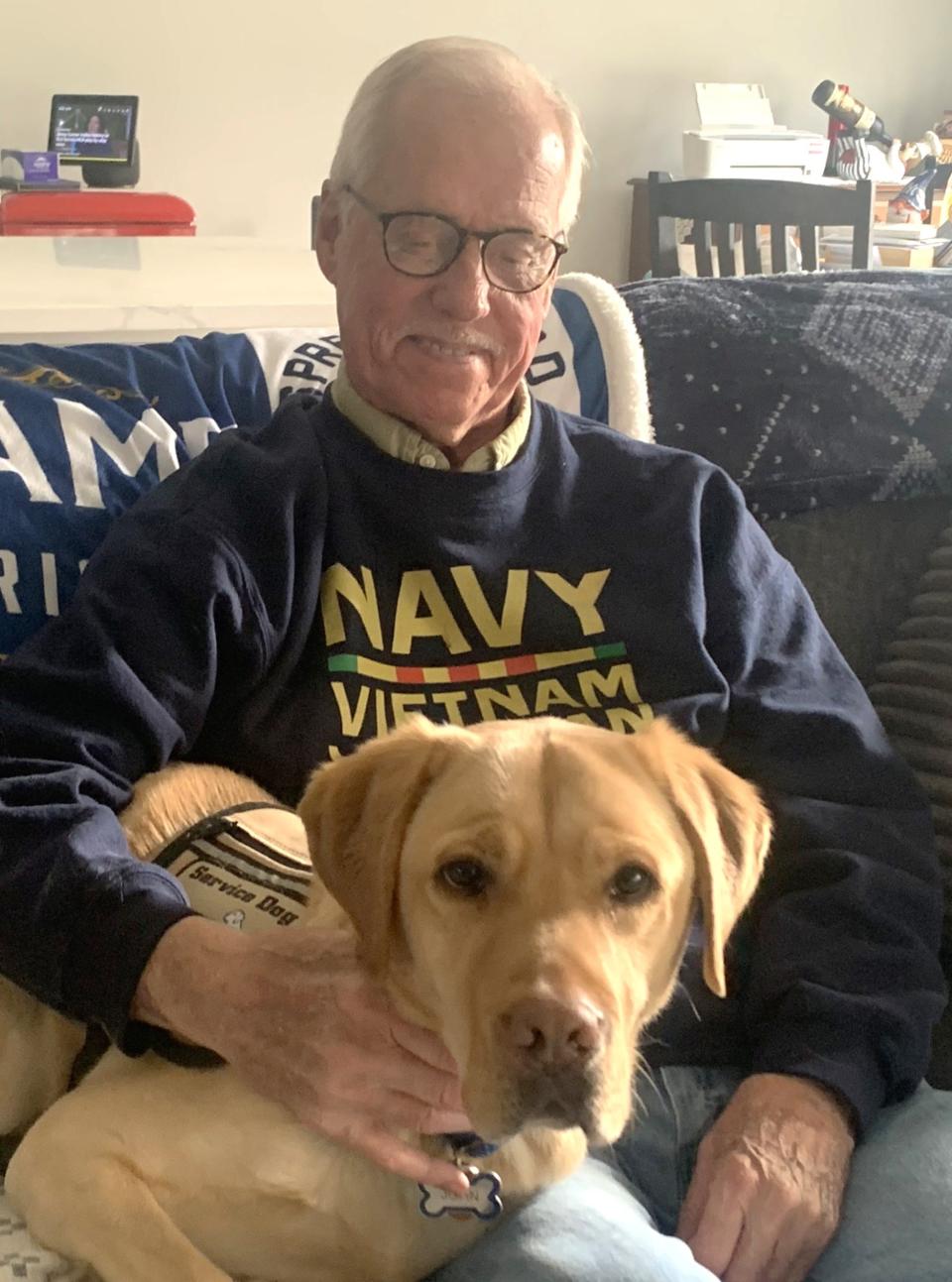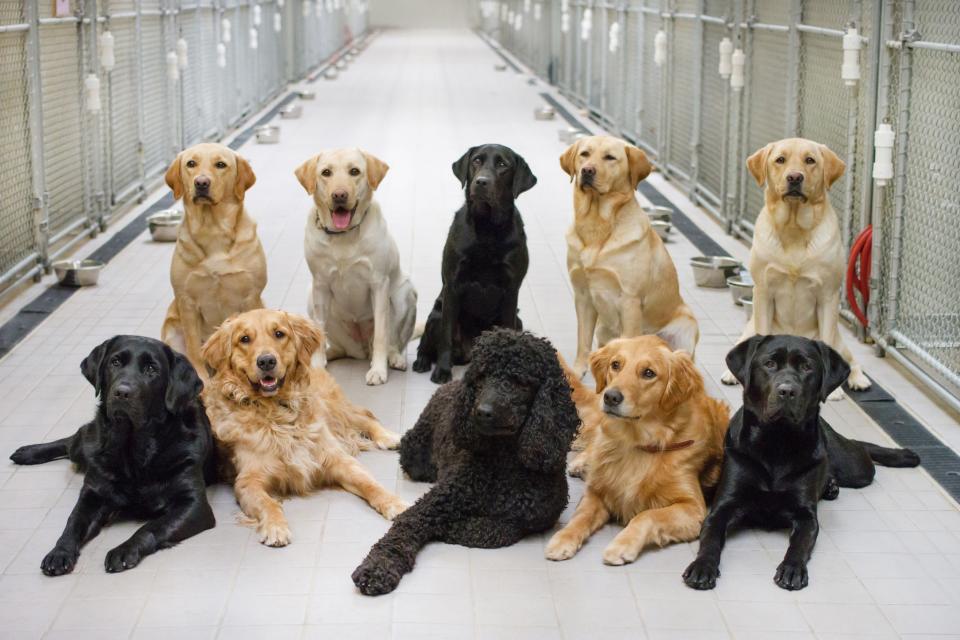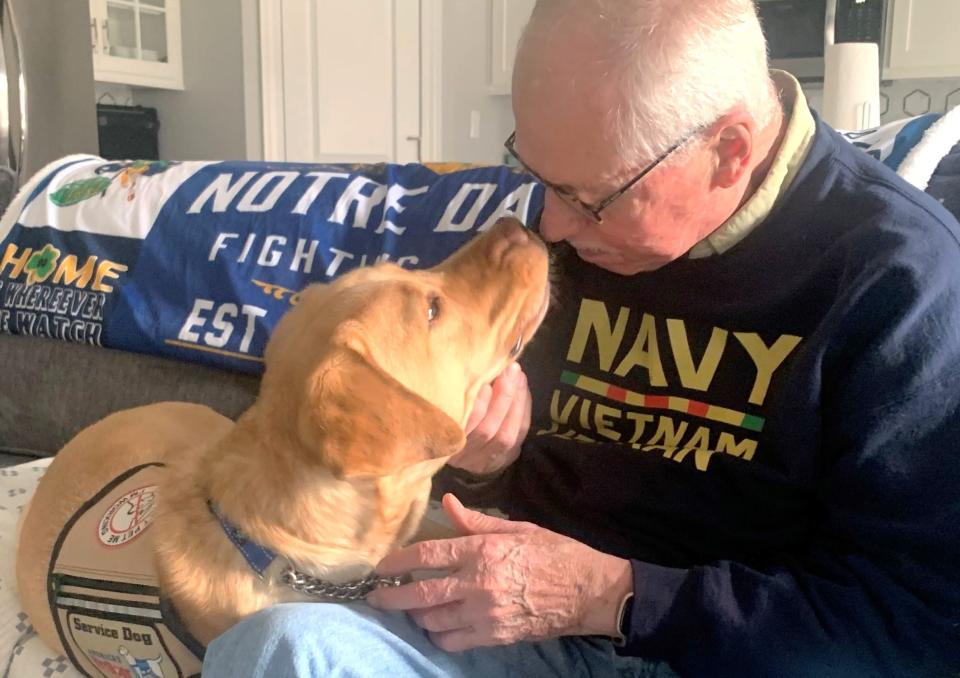America's VetDogs: Service dog gives Horseheads veteran with PTSD new leash on life
Mike Wesneski, of Horseheads, saw combat during the Vietnam War, and suffered for years afterward with post-traumatic stress disorder — through three marriages and multiple jobs.
Then Wesneski met John, and his whole world changed.
John isn't a therapist. He's a dog, a yellow Labrador retriever to be exact. But he isn't just any dog.
John was specially trained by an organization known as America's VetDogs to help veterans such as Wesneski — who are struggling with combat-related physical and emotional issues — find a sense of normalcy again.
"I can't expound enough how great this program is," said Wesneski, 77. "Having (John) has changed my life totally."
Vietnam vet struggled after return home
Wesneski was born in Blossburg but grew up in Elmira.
When he was 17, his parents told him they didn't have the money to send him to college, so he got their permission to join the U.S. Navy, even though he wasn't yet of age, knowing with the Vietnam War raging he would probably be drafted anyway when he turned 18.
Wesneski joined the Navy in 1964 to see the world, but what he mostly saw was fierce combat while serving on a destroyer off the coast of Vietnam.

In one circumstance, his ship was hit by shells fired from shore and started taking on water. For a terrifying instant, Wesneski thought he and others were going to die.
"There were no fatalities, but it was very unnerving," he said. "I intended to stay (in the Navy) for 20 years. When I was 21, I got out. I came home and told my parents I wasn't going to do anything for a couple months."
Back in the states, Wesneski was thousands of miles from the horrors of war, but the psychological damage came home with him. Sudden sounds, or even people walking up undetected behind him could send him into a panic.
"The PTSD manifested over time," said Wesneski, who added like many returning Vietnam veterans, he was greeted with hostility by many people who opposed the war.
"Other people talk about combat like it was a walk in the park," he said. "For me, it's not. It's affected my life for 50 years."
Using dogs to give troubled veterans a second chance
After World War II ended, the Guide Dog Foundation was established to provide trained dogs and training at no cost to veterans returning from the battlefields of Europe and the Pacific.
In 2003, the foundation created a new affiliated organization — America's VetDogs — to help cope with a greater need for service dogs for aging veterans and those returning from recent conflicts.
In 2006, America's VetDogs became a separate 501(c)(3) nonprofit corporation, but the two organizations continue to share staff and other resources.
America's VetDogs, headquartered in Smithtown, New York, trains service dogs to assist veterans across the country with a variety of issues, including physical disabilities, blindness or low vision, and PTSD.

Veterans pay nothing for their canine companions, even though it costs more than $50,000 to breed, raise, train, and place just one assistance dog.
Funding for the program comes through donations by individuals, corporations, foundations, businesses, and community organizations.
America's VetDogs trains both the dogs and the veterans, and works hard to make sure each pairing is a good fit, said service dog instructor Maria Nuzzi.
"We require a lot of information. We find out all about their medical history and do an interview. A lot of that goes on their application," Nuzzi said.
"We do aftercare as well," she said. "We call them once a week for six months, go over questions about things that happened. At one year, we retest all of (the dogs') skills."
Most of the dogs in the program are Labrador retrievers or Lab/golden retriever mixes, Nuzzi said.
America's VetDogs also farms the dogs out to various prisons during their training, where inmates will work with them on learning various tasks, she said.
Working with the veterans and the dogs is a rewarding experience, Nuzzi added, especially when she sees how quickly the canines can make a difference.
"We see a huge change in the veterans in such a positive way. They will be sleeping better at night and be less nervous," Nuzzi said. "When that happens right in front of you, it's a beautiful thing."
More: $200 million in utility credits now available to New Yorkers. What to know
'He's my family, my constant companion'
After being downsized out of a few jobs upon his return to civilian life, Wesneski finally settled into a nearly three-decade career with the U.S. Postal Service.
His personal life was less settled, and he believes his PTSD was a contributing factor to three failed marriages. He has limited contact with three adult children.
Wesneski dealt with crushing loneliness for years, and brushed off suggestions from friends that he should get a dog, thinking he had neither the time nor the inclination to break in a new puppy.
Then Wesneski came across some information about America's VetDogs, and decided to give it a shot. But the immediate response wasn't encouraging.
"I submitted an application and was told there was a 24- to 36-month wait," he recalled. "Then one day I got a call and they said they had an opening and was I still interested in getting a dog?"
The answer was yes, and in December 2022, Wesneski traveled to Smithtown for some intense training and an introduction to his new best friend.

Once back home in Horseheads, John had an immediate and profound effect.
"I had a lot of issues with nightmares," Wesneski said. "Since I've had him, my nightmares have decreased an unbelievable amount. He comes and wakes me up. He's trained to know.
"He's my family, my constant companion," he added. "I go nowhere without him."
In fact, John has almost become the better known member of the duo when they go different places.
"I'll walk into the Elks Club or the barber shop and they will say 'Hi John! Uh, hi Mike,'" Wesneski said with a chuckle.
Wesneski calls John his "saving grace" and he hopes other struggling veterans can also get a fresh start with the help of America's VetDogs.
"He's all I've got, and it doesn't sound very good but he's really all I want," he said. "I love him to death. He's such a great dog."
Follow Jeff Murray on Twitter @SGJeffMurray. To get unlimited access to the latest news, please subscribe or activate your digital account today.
This article originally appeared on Elmira Star-Gazette: Horseheads veteran gets relief from PTSD with help of service dog

